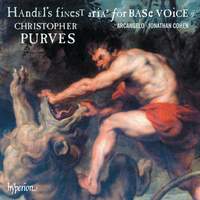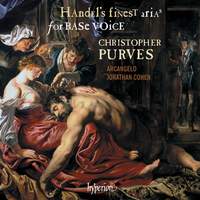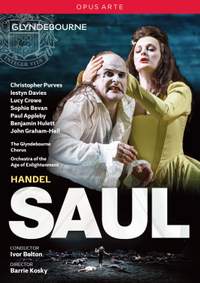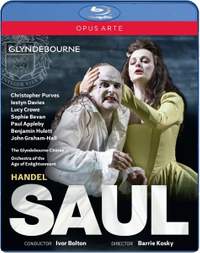Interview,
Christopher Purves on Handel
 The British bass-baritone Christopher Purves has won widespread acclaim for his portrayals of characters as diverse as Wagner’s Alberich and Beckmesser, Mozart’s Don Giovanni, Verdi’s Falstaff and The Protector in George Benjamin’s Written on Skin, but over the past few years it’s been his interpretations of Handel (on stage and on disc) that have garnered awards and nominations galore: the first volume of his Finest Arias for Base [sic] Voice on Hyperion was shortlisted for both BBC Music Magazine and Gramophone awards in the 2013/14 season, and Barrie Kosky’s astonishing production of Saul at Glyndebourne (in which Purves sang the title-role) won a Royal Philharmonic Society Award in 2016. (You can read my 2016 interview with him about bringing Saul to life here.)
The British bass-baritone Christopher Purves has won widespread acclaim for his portrayals of characters as diverse as Wagner’s Alberich and Beckmesser, Mozart’s Don Giovanni, Verdi’s Falstaff and The Protector in George Benjamin’s Written on Skin, but over the past few years it’s been his interpretations of Handel (on stage and on disc) that have garnered awards and nominations galore: the first volume of his Finest Arias for Base [sic] Voice on Hyperion was shortlisted for both BBC Music Magazine and Gramophone awards in the 2013/14 season, and Barrie Kosky’s astonishing production of Saul at Glyndebourne (in which Purves sang the title-role) won a Royal Philharmonic Society Award in 2016. (You can read my 2016 interview with him about bringing Saul to life here.)
Almost six years after that first Handel recital-disc, Purves and Arcangelo are back with a second helping of Handel, including arias from Esther, Athalia, Belshazzar and Joshua. I spoke to him in between rehearsals for Glyndebourne’s new production of Pélleas et Mélisande (in which he sings the role of Golaud) about how working on Saul has informed his approach to recording Handel in the studio, the contrasts between the new album and its predecessor, and how he went about selecting a second batch of Handel’s ‘finest’ arias…
Since recording the first volume of Finest Arias for Base Voice back in 2012, you’ve created the title-role in Barrie Kosky’s extraordinary staging of Saul at Glyndebourne – how much has your approach to characterising Handel altered as result of that experience?
I think that in a way working on Saul really confirmed my view of Handel, in that I've always thought about him as being a composer that you can approach as something of a blank canvas, because the raw materials which he provides are so wonderful. Handel sets up such possibilities, and it's up to the people who are taking charge of the score (the director, the conductor, the performers) to do with it what they will. Originally I didn't really think there was a huge amount that I could do with Saul, because there's simply not very much to sing; the role itself is a relatively small one, and the oratorio is more about what other people see in Saul and about how he affects them. But the extraordinary thing which I discovered was that if you're prepared to be a little bit brave, you can really do whatever you want with this music: I'm not saying that you should turn it into something it’s not, but what you are allowed to do is experiment. As long as you do it with what they'd have called ‘decorum’ in the seventeenth and eighteenth centuries, then in a way the aria is your oyster!
And I simply carried that on with this project. I think if you can apply that approach to one piece, surely there are other operas and other oratorios that you can look at afresh and find new perspectives – I wonder what might happen if we looked at something like Acis and Galatea with the same degree of powerful imagination… The other nice thing about revisiting Handel in terms of individual arias was seeing just how much great material there is; I felt a bit sheepish about calling this album Finest Arias for Base Voice... Volume 2!, but I really didn’t want it to seem as though this was a B-list disc: in no way are these arias inferior to those on the first album, they just have a different feel to them. That said, I do think we've probably exhausted the ‘finest’ ones for bass now as far as Handel is concerned, so there probably won't be a Volume 3!
As well as arias from opera and oratorios, the album also includes the rather extraordinary solo cantata Nell'Africane Selve - do you have any theories on why this work is so rarely performed and recorded?
Well, for one thing it's fairly long (about 17 minutes) - but I think the main reason is that it's pretty much impossible to sing! It really does require what one might call special treatment: as with 'Fra l’ombre e gl’orrori' from Aci, Galatea e Polifemo (which we included on the first disc), you're going from a tenor top A right down to the bottom end of the bass range (a low C sharp, in this case) so the piece covers just under three octaves, which is an enormous distance for one voice - and the jumps themselves are huge. Interestingly, I don’t think there’s actually any evidence that Nell'Africane Selve was written for the same singer as Aci, Galatea e Polifemo (though you’d have thought so just because of the outlandish vocal requirements) – normally Handel used to write the names of the singers he was composing for on the manuscript, but in this case he didn’t.
Do you feel that the personalities on display in this volume contrast with the characters we met in the first instalment?
I do think they are a very different set, actually, which I quite like – the atmosphere on this album is just that little bit more intimate. There are still a few of the slightly histrionic types, of course, but I deliberately chose a fair number of slower, more reflective arias this time around. I couldn’t say for certain how much of the programme was the result of conscious planning and how much was simply down to what was left once we started looking through possible repertoire, but what I do know is that a lot of these arias really did leap out and say hello to me. Perhaps with that first disc I was looking for things that were generally fiery and gung-ho and would make a strong immediate impact, whereas with this disc I was after something a bit more introverted, a bit more self-regarding and contemplative.
Do you see any parallels between the predicaments of these characters and Saul’s emotional journey?
I don’t think that in any one aria you’re ever going to find anything quite as vivid as Saul’s breakdown, especially as depicted in Barrie's production. But there were certainly moments during the recording where I was able to draw on my experience of characterisation in Saul, and to approach individual arias with that same level of imagination. For instance, the first track on the second disc is a wonderful aria from Siroe, and I spent a lot of time looking for ways to make it even more vivid: the text is ‘Gelido in ogni vena’, so we have a father describing how the blood freezes in his veins when he thinks of the ghost of his murdered son. ’Figlio esangue’ isn’t an easy phrase to translate, but he’s talking about his son literally ‘bleeding out’ - how do you depict something as extraordinary as that with the voice? Jonny Cohen and I were looking through the text together and decided to experiment with taking all the body out of the voice on words like ‘ombra’ and ‘gelido’, and it really worked – at least, I think it worked, and I hope listeners feel the same! When you’re working on a recording you often think ‘Is this worth it? Why don’t you just sing the notes and stop faffing around?!’, but ultimately taking those kinds of interpretative risks is what really brings the music to life. And I don’t think that without having delved into the mind of Saul in collaboration with Barrie (and also factoring in Jonny’s own very vivid imagination for the recording) I would necessarily have been prepared to do that to the same degree.
Not everything on this album is strictly 'by' Handel...
I was talking to an academic recently about appropriation of songs and arias in the eighteenth century, and discovered that quite a few composers used to swipe each others’ work and then just slightly revise it - the aria 'È ver che all'amo intorno' from Catone is a prime example of that. The original was actually by Porpora, but Handel thought ‘Hmm, I think he’s missed a trick or two here…’ and decided to rework it, partly to explore what he saw as undeveloped possibilities but also partly in order to disguise the fact that it’s not actually by him! I wouldn’t put it on a par with Handel’s very greatest arias, but I do think it’s a very interesting piece on its own terms, because I don’t think I’ve ever heard the bass voice combined with violin obbligato and solo bassoon! Our violinist and bassoon-player from Arcangelo absolutely nailed it in rehearsals: I remember thinking ‘Well, what do I do?! How do I fit in?’, and then I thought ‘Just leave them be! It's not all about the voice all the time - let me be an accompaniment'.
Funnily enough, I was asked to sing in something by Porpora five or six years ago, and the production-team said: ‘There’s actually not very much for you to sing, but we thought you could do 'Fra l’ombre e gl’orrori' from Aci, Galatea e Polifemo…’. I was a bit sceptical, but they said it was quite a regular practice at the time: if the singer thought there wasn’t quite enough for him or her to do, they’d just bring something else along and interpolate that. I suppose the mindset was 'Well, it went down really well in Drury Lane, so let’s see what they think about it here!'.
How does it feel to be working on another project at Glyndebourne whilst the revival of Saul is being rehearsed next door?
It certainly felt a bit strange at the beginning, because Saul was one of the most extraordinary experiences of my life, and here I am working on something that could hardly be more different whilst someone else explores that role just a few rooms away! But Pelléas is so complex and so full of its own challenges that I soon found myself totally immersed in that world: Stefan Herheim is the most fascinating director, and works very much in the Richard Jones style in terms of letting everything evolve from the score rather than imposing anything on the characters or the dramatic structure. We're uncovering so many layers in every single rehearsal, and I think the production will be something very special indeed.
Handel's Finest Arias for Base Voice, Vol. 2
Christopher Purves (baritone) Arcangelo, Jonathan Cohen
Placeholder description
Available Formats: CD, MP3, FLAC, Hi-Res FLAC
'Purves gives us masterful, dazzling and powerful performances of scenes from 15 of the composer’s dramatic works, lithely and splendidly supported by up-and-coming ensemble Arcangelo and conductor Jonathan Cohen. In short, this is the most outstanding album of its kind I’ve ever heard from any singer.' (Early Music Today)
Available Formats: CD, MP3, FLAC, Hi-Res FLAC
Handel: Saul (DVD)
Christopher Purves, Iestyn Davies, Lucy Crowe, Sophie Bevan, Paul Appleby, Benjamin Hulett, John Graham-Hall; Orchestra of the Age of Enlightenment, Ivor Bolton, Barrie Kosky
Placeholder description
Available Format: DVD Video
Handel: Saul (Blu-ray)
Christopher Purves, Iestyn Davies, Lucy Crowe, Sophie Bevan, Paul Appleby, Benjamin Hulett, John Graham-Hall; Orchestra of the Age of Enlightenment, Ivor Bolton, Barrie Kosky
Placeholder description
Available Format: Blu-ray






